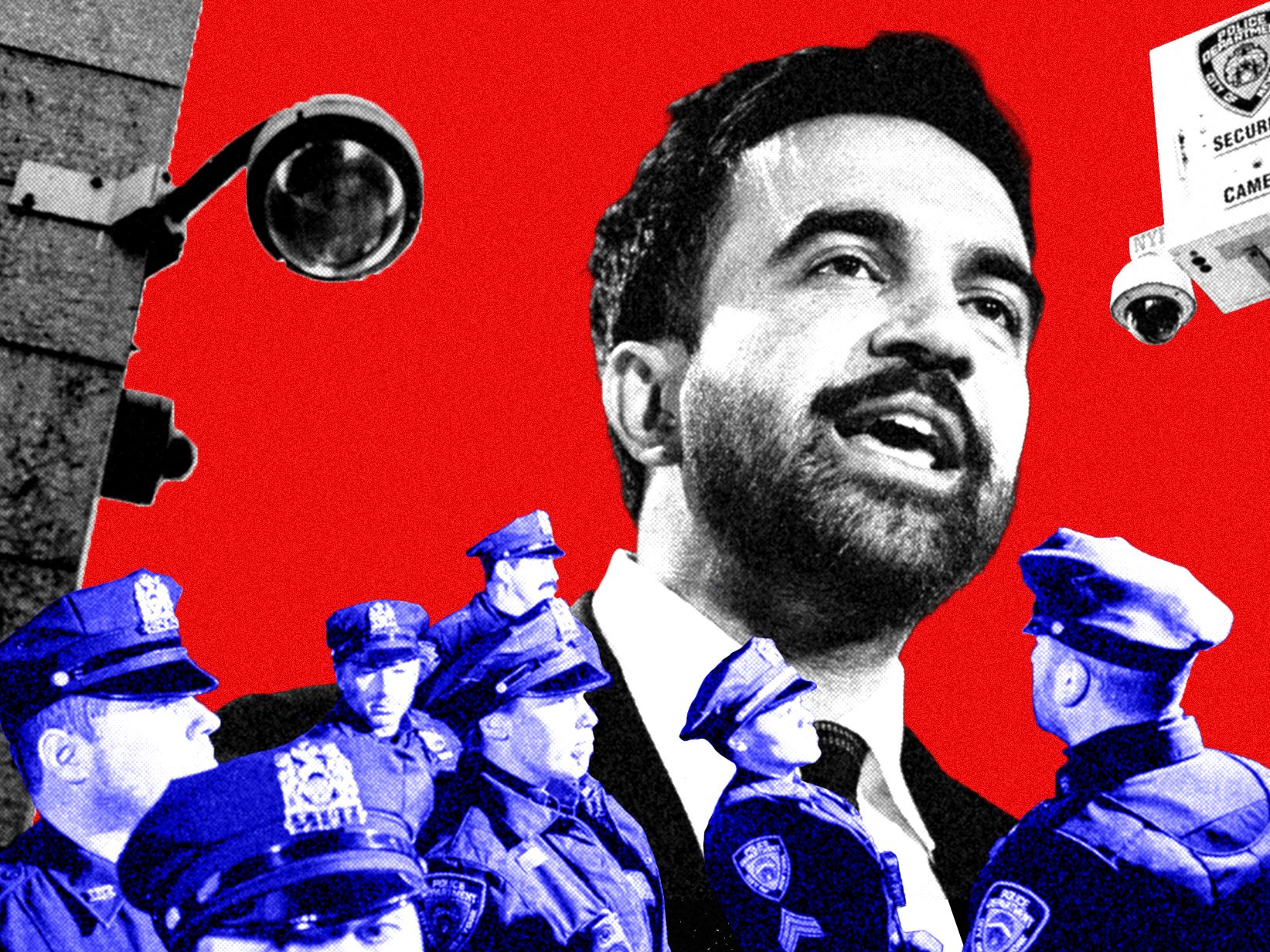New York City mayor-elect Zohran Mamdani may have an ambitious policy agenda, but overhauling the self-governing and deeply dysfunctional behemoth that is the New York City Police Department is not on the list. Mamdani surprised supporters by asking current Police Commissioner Jessica Tisch to stay on after his inauguration early next year. Tisch, a technocrat heir to a vast real estate fortune, clashes with Mamdani on several fronts, including policy (she believes New York State’s bail reforms caused rising crime) and the geopolitics that inevitably make their way into New York City’s streets. (Tisch’s family are key figures in the Israel lobby; Mamdani is vociferously pro-Palestinian.)
One area where Mamdani is guaranteed to clash with Tisch is on the NYPD’s massive technical surveillance apparatus and intelligence-gathering methods, which have metastasized since 9/11 to levels that rival the capabilities of a midsize country. More than one observer has characterized the NYPD as operating more like a US intelligence agency—at one point, the department’s Intelligence Division was run by a CIA veteran, and at least one CIA analyst was embedded at NYPD—than a police department.
While Mamdani’s public safety proposals center on the creation of a $1 billion Department of Community Safety that will handle non-emergency 911 calls in place of armed cops, some of his other stated positions conflict directly with Tisch’s own positions and background with the NYPD, where she got her start in the department’s controversial intelligence division during the height of its “mosque-raking” mass surveillance of Muslim New Yorkers.
Experts say the stakes in the current moment are far higher with regard to surveillance, largely due to the federal government’s nationwide immigration blitz using surveillance data gathered by police departments to track down and arrest targeted people.
Andrew Guthrie Ferguson of George Washington University Law School studies the use of high-tech surveillance by law enforcement and is the author of The Rise of Big Data Policing. He has studied the NYPD’s sweeping buildout of networked CCTV, gunshot detectors, license plate readers, and video analytics since 9/11. The current wave of federal immigration raids, he says, have made clear how local police data such as fingerprints and license plate scans can be weaponized by an authoritarian administration and makes the current moment ripe for a reckoning on police surveillance.
“In a horrible way, the sense of how technologies can be weaponized against people has expanded,” Ferguson tells WIRED. “When the government expanded its targeting, it also expands the conversation beyond the poor Black communities that were initially targeted by things like CCTV networks and predictive policing.”
Mamdani’s campaign did not respond to a request for comment.
The NYPD’s turn toward mass surveillance was begun in earnest by Commissioner Raymond Kelly during the immediate aftermath of September 11, buoyed by hundreds of millions of dollars in federal anti-terrorism grants. However, Ferguson says Kelly’s rival, former commissioner William Bratton, was a key architect behind the NYPD’s reliance on “big data,” by implementing the CompStat data analysis system to map and electronically collate crime data during the mid-1990s and again during his return to New York City in 2014 under Mayor Bill de Blasio. Bratton was also a mentor to Jessica Tisch and has spoken admiringly of her since leaving the NYPD.
Tisch was a main architect of the NYPD’s Domain Awareness System, an enormous, $3 billion, Microsoft-based surveillance network of tens of thousands of private and public surveillance cameras, license plate readers, gunshot detectors, social media feeds, biometric data, cryptocurrency analysis, location data, bodyworn and dashcam livestreams, and other technology that blankets the five boroughs’ 468-square-mile territory. Patterned off London’s 1990s CCTV surveillance network, the “ring of steel” was initially developed under Kelly as an anti-terrorism surveillance system for Lower and Midtown Manhattan before being rebranded as the DAS and marketed to other police departments as a potential for-profit tool. Several dozen of the 17,000 cameras in New York City public housing developments were also linked through backdoor methods by the Eric Adams administration last summer with thousands more in the pipeline, according to NY Focus.
Though the DAS has been operational for more than a decade and survived prior challenges over data retention and privacy violations from civil society organizations like the New York Civil Liberties Union, it remains controversial. In late October, a Brooklyn couple filed a civil suit along with Surveillance Technology Oversight Project (STOP), a local privacy watchdog, against the DAS, alleging violations of New York State’s constitutional right to privacy by the NYPD’s persistent mass surveillance and data retention. NYPD officers, the suit claims, can “automatically track an individual across the city using computer vision software, which follows a person from one camera to the next based on descriptors as simple as the color of a piece of clothing.” The technology, they allege, “transforms every patrol officer into a mobile intelligence unit, capable of conducting warrantless surveillance at will.”
“It’s a really open question about whether he’ll push policies that’ll dismantle the infrastructure of mass religious and racial profiling and the pseudoscience of surveillance as safety, and focus on evidence based alternatives, or he’ll be too afraid of the NY Post,” says Albert Fox Cahn, the founder in residence of STOP. Referring to Tisch as the “mother of the DAS,” Fox Cahn questioned why Mamdani would choose to retain a police commissioner with a record on privacy and criminal justice that runs contrary to the mayor-elect. For instance, Mamdani has vowed to get rid of the NYPD’s controversial gang database—an elimination Tisch strongly opposes.
“This raises a fundamental question: When mayors are so terrified of firing police commissioners who are inconsistent with their own agenda, do we really have democratic oversight of policing?” Fox Cahn says. “Are they overseeing police in name only, and if not, what does that say about the state of democracy in America? Forget Trump; this is on the local level.”
Municipal oversight of the NYPD’s massive surveillance arsenal is indeed lacking. Even though New York City passed a relatively mild oversight law for the NYPD’s surveillance gear in 2020 that required the agency to disclose the purchase and deployment of new surveillance technologies, the department refused to comply. As a result, there is still no public accounting for the contracts, use policies, and deployments of many of the NYPD’s most invasive tools, including drones and robot dogs.
Elizabeth Joh, a law professor at the UC Davis School of Law who has long studied police intelligence and surveillance practices, says that Mamdani’s progressive ideals are on a collision course with the NYPD’s operational model, which is founded on pervasive surveillance of the city.
“What does it mean to be the mayor of a big American city, where the police have absolutely embraced techno-solutionism as policing, as the dominant attitude toward policing?” Joh says.
One potential inflection point for NYC could be future immigration sweeps like those in Los Angeles and Chicago, where police are making use of data collected by local cops and biometric software to hunt down undocumented people. “Immigration enforcement will almost certainly be a flash point: The use of technology in that context is alarming people, and I’m not surprised feds are using live facial recognition,” Joh says.
A New York Department of Investigation report last year lambasted Mayor Eric Adams and police officials for buying and deploying several new tools, including a semiautonomous robotic dog; an entirely useless Knightscope “security” robot; the StarChase GPS system, which allows officers to fire a tracking projectile designed to stick to a car; smartphone fingerprinting technology; and an augmented-reality program police officers can download on their phones.
In August, the Legal Aid Society urged the city Department of Investigation to scrutinize the NYPD’s use of facial recognition technology after The City reported that the NYPD used an FDNY account with Clearview AI to identify a pro-Palestine protester at Columbia University. The NYPD also maintains a facial recognition database that includes photographs of juveniles, according to 2019 reporting by The New York Times.
Three bills are currently in front of New York’s city council to ostensibly strengthen its visibility into the NYPD’s surveillance arsenal (including a requirement to draft formal facial recognition use and audit policies). However, the City Council has far less power to scrutinize and set policy for the police department’s spying capabilities than many other cities that passed legislative reforms in the 2010s thanks to intense lobbying by the NYPD against a stronger bill.
Beyond creating a Department of Community Safety, Mamdani’s other rare point of policy clarity on public safety concerns the department’s repressive approach to protests and the role of its controversial intelligence division in conducting mass surveillance on Muslim New Yorkers.
The Demographics Unit, created under former commissioner Ray Kelly by a CIA officer loaned to the NYPD in the mid-2000s, went about mapping Muslim and Middle Eastern communities in the city’s five boroughs. Meanwhile, undercover officers were sent to infiltrate religious congregations and student groups as far afield as Connecticut and New Jersey.
Although the Demographics Unit has been disbanded, and the department’s “mosque-raking” operations led to a legal settlement, activists and legal workers say the department’s surveillance in Middle Eastern and South Asian communities is still prevalent.
Notably, Tisch’s family is best known around New York City for its philanthropy, with the family name adorning concert halls, museum wings, and university departments. The family is also known for donating heavily to Israeli causes (Jerusalem’s Tisch Biblical Zoo, for example), with Jessica’s father playing key roles in the US Israel lobby and donating heavily to both pro-Trump Republican congressional candidates and GOP political action committees. Her extended family threw at least $900,000 into supporting Andrew Cuomo’s failed NYC mayoral bid—including her mother, former New York state regent Merryl Tisch.
Jessica Tisch got her start at the NYPD in the Kelly-era Intelligence Bureau building dossiers on Muslim extremism. In January, she gave the opening remarks at a training on “combatting antisemitism” that labeled participants in Students for Justice in Palestine as “campus extremists” and claimed that SJP was responsible for a 300 percent increase in antisemitism at American colleges and universities. At the training, keffiyehs and watermelons were branded as “antisemitic symbols” that “incite hatred, violence, or discrimination against Jewish individuals or communities.”
The NYPD’s violent repression of pro-Palestinian protests, documented extensively by The Nation, will almost certainly be an issue for Mamdani. Senior NYPD officials have attended trainings and events held by far-right Zionist organizations, and the agency is still fighting court-ordered restrictions on protest policing imposed as part of a settlement for its behavior during the 2020 George Floyd demonstrations.
Another open question is the NYPD’s ongoing use of the New York City Police Foundation as a conduit for controversial surveillance technology and the underwriting of its overseas detectives program by foreign governments. The foundation still foots the $1,204,126 bill for the NYPD Intelligence Bureau’s “international liaison” program that posts detectives overseas to 11 countries, including Israel, Spain, France, Australia, and Singapore. That cost rose significantly from $948,261 in 2023.
In the past, corporations that did business with the NYPD also contributed money to the foundation, raising questions about quid pro quos and the use of the police “booster” nonprofit as a way to circumvent public procurement procedures, particularly for surveillance equipment. The United Arab Emirates also paid $1 million to the NYC Police Foundation, according to 2012 tax records, which was the same amount that covered the entire overseas detectives program that year, according to a report by The Intercept. An NYPD detective has been posted to Abu Dhabi since 2009.
The Police Foundation also serves as a key nexus for the local business community’s influence over the NYPD. Two members of Tisch’s family sit on the NYCPF’s Board, according to the nonprofit’s latest tax filings. Per reporting by veteran police scribe Leonard Levitt, one of Tisch’s relatives convinced then-commissioner Ray Kelly to give her a posting in the NYPD in the late 2000s, leading to her hiring. Kelly denied Levitt’s reporting in a 2015 interview with Bloomberg. Tisch did not respond to WIRED’s requests for comment. In an interview with The Wall Street Journal in late 2024, Tisch said that a “friend” made the key connection with Kelly and steered her to the intel division job.
The Police Foundation is also involved in the NYPD’s rapid expansion of its drone unit under Mayor Eric Adams. In 2024, the foundation spent $230,750 to buy drones for the NYPD’s transit command. At the time, the department’s drone expansion was overseen by Kaz Daughtry, a controversial police official and Adams ally who faces accusations of heavy drone surveillance by pro-Palestine activists and residents of Brooklyn neighborhoods subjected to blanket drone patrols during Labor Day cookouts in 2023.
Although Mamdani’s mayoral campaign was defined by his relentless emphasis on affordability, the looming battles with the Trump administration over immigration enforcement and the breakneck buildout of the NYPD’s already formidable surveillance arsenal under Adams means he will be forced to reckon with the police department’s spying programs.
”Mass surveillance endangers all values at the heart of our democracy, and I do hope that our next mayor is willing to be a spokesperson for this cause,” says STOP’s Fox Cahn. “You can’t be a sanctuary city and a surveillance state—you can’t promise to protect undocumented neighbors and provide a data pipeline to ICE.”




